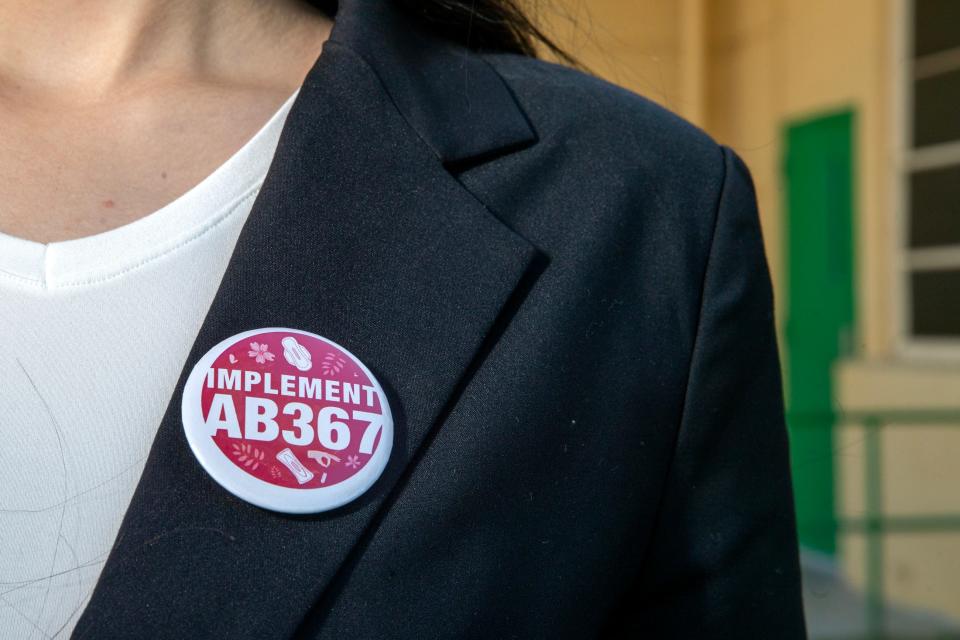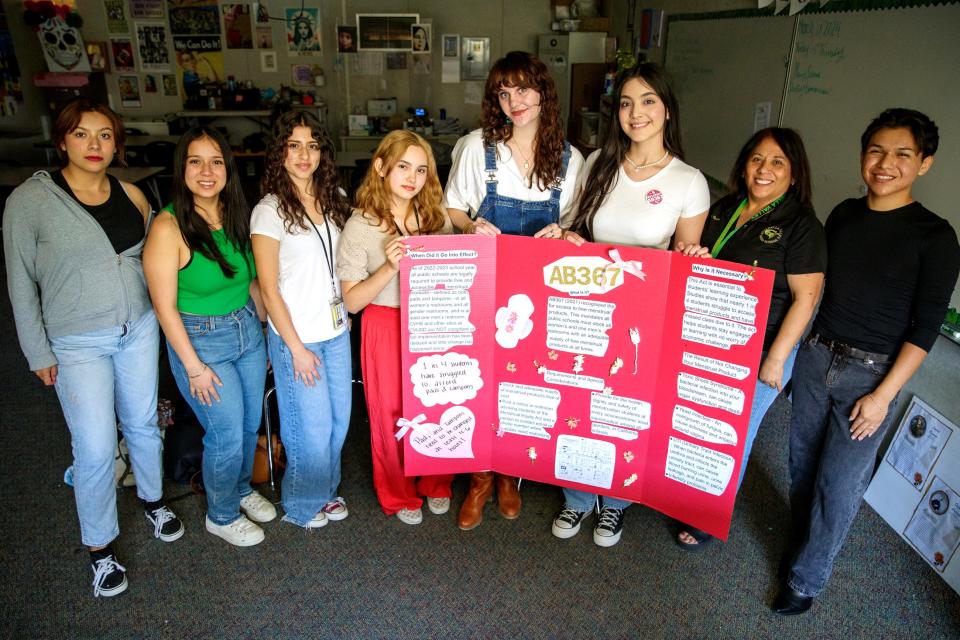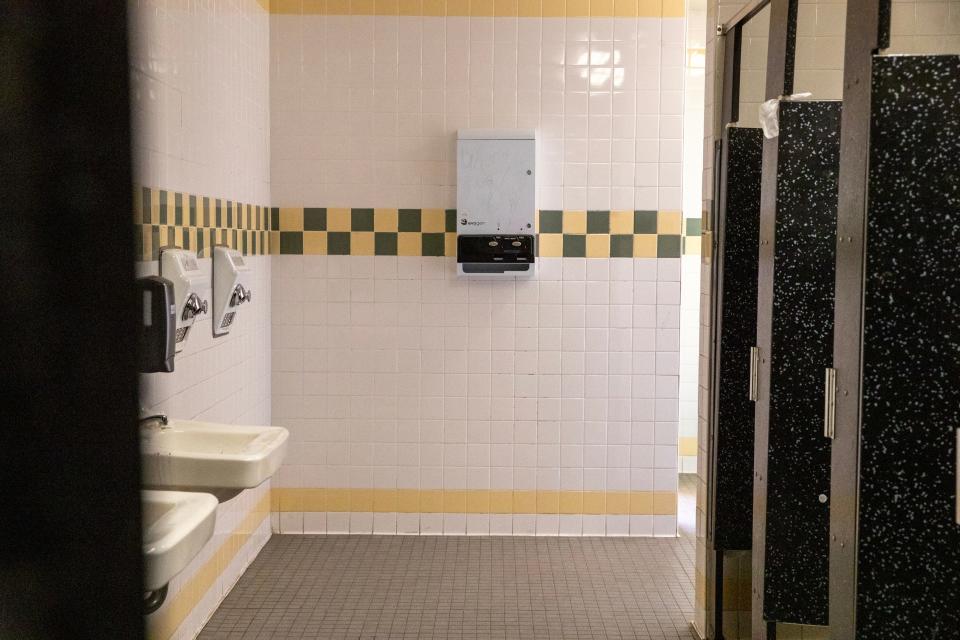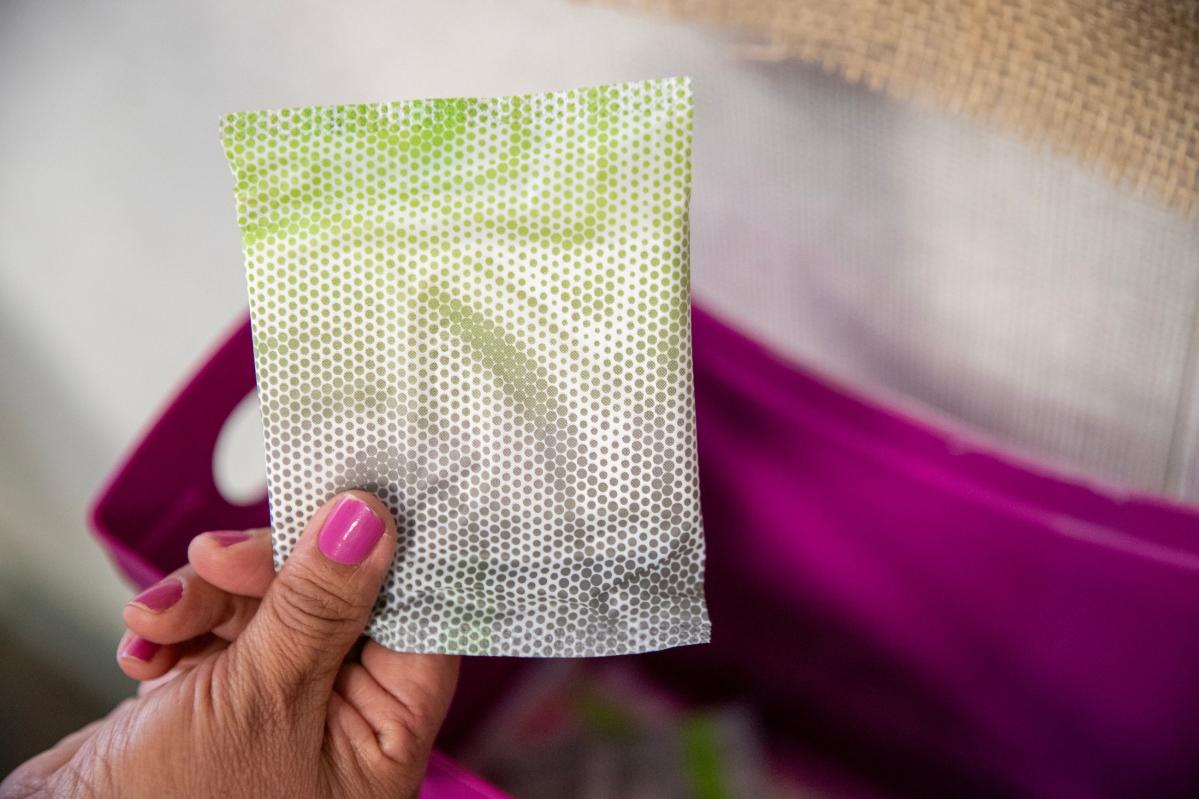While on her lunch break at Coachella Valley High School in Thermal, senior Daniella Estrada encountered a familiar predicament that many students can relate to: she unexpectedly started her period and did not have a menstrual pad on hand. She hurried to one of the main restrooms in search of one, only to be redirected by an administrator to another restroom closer to the cafeteria — where she soon discovered it wasn’t stocked.
By that point, her pants were stained red. “It was horrible and I was embarrassed. I was crying,” Estrada said, her voice shaking. “To this day, it still gets me.”
Estrada is among a group of students involved in the Young Women’s Empowerment Club, a student-led organization dedicated to advocating for women’s issues both within the school and in the broader community. One central issue has become their primary focus: ensuring that their school provides access to free menstrual products, as required by California law. Compliance, however, has been a challenge.
A community built on menstrual equity advocacy
The Menstrual Equity for All Act, or AB 367, requires that by the 2022-23 school year, all public schools serving grades 6-12 must maintain a sufficient supply of free menstrual products, including pads and tampons, in all women’s restrooms, gender-neutral restrooms and at least one men’s restroom. The law also requires that every restroom must have clear and viable notices notifying students of their rights, along with contact information for school staff responsible for maintaining stocked menstrual products.
After two years of advocacy, the students have made significant progress, holding the school district and the school accountable for full compliance — an issue, they said, represents an inequity that only young women have to cope with.

The initiative began in Sept. 2022, when alums Carla de Leon and Julian Castrejon — now students at Brown University and UC Berkeley, respectively — organized tabling events during lunch to raise awareness about period poverty among students. Under their leadership, the club collected over 5,000 menstrual supplies through a period product drive. They organized the pads and tampons into baskets and placed them in certain restrooms and classrooms across campus.
“Then we crafted a survey that we spread to all the students and we asked questions like, ‘Have you had to miss school because you didn’t have enough money to pay for menstrual products? Have you been to the bathrooms here and they didn’t supply that for you? Has that caused you to miss class? Has it interfered with your education?'” de Leon said.
They collected more than 400 responses. “It was powerful,” Castrejon said, “because at our campus, we’re not only battling admin not being responsible, but we’re also battling with generational trauma and cultural adversities. I feel that’s what really made it impactful because you don’t really see communities coming together for women’s rights. It’s all about machismo.”
They presented the data to their school’s leadership team. “We literally mapped it out for them,” de Leon said. “Their jaws were on the floor.”
“We thought, finally, the cause is going to be alleviated,” said Castrejon, “but we didn’t see any improvement from them. Actually, the only improvement we saw, which was kind of weird, was that someone came to Ms. Penalber’s class one day with boxes of period products. We were like, ‘It’s not our job to put them in place.’ In reality, we were just advocating for the cause.”
This was after their club adviser, Perla Penalber, had reached out to one of the school board members. “I should have been more specific,” she said with a laugh. “That was not the ask.”
The rest of the students joined her in laughter. Perhaps it was a message lost in translation, as Penalber is known to stock a purple bin by her classroom door with menstrual products. But the law, she maintains, clearly outlines that the restrooms — not just the health office, not her classroom — need to be stocked. The students also insisted that they shouldn’t have to rely on the kindnesses of their teachers, like Penalber, to buy them menstrual products.
“We’ve been told that the (menstrual products) the school provides are not the nice quality ones I have because we did the period product drive,” Penalber said. “We don’t care. At the end of the day, I don’t care if I’m wiping with Charmin or the Costco brand, you know. I just need toilet paper. That it gets compared to that, it’s just these undertones of sexism, like you’re missing the point.”
The issue isn’t going away, Penalber said. “Not only is this affecting our students from low socioeconomic backgrounds and students of color, but our girls, they’re getting left behind,” she said.
Out of the 2,657 students enrolled at CVHS during the 2022-23 school year, nearly 99% are of Hispanic or Latino descent. State data from that academic year indicates that 89.8% of students were classified as socioeconomically disadvantaged. Additionally, 48.1% of the student population identify as female.
“It’s a necessity, and it should be treated as such,” said senior Gema Gonzalez, daughter of CVUSD board member Jesus Gonzalez. “It’s like having toilet paper stocked in the restrooms. The fact that we’re not able to have pads and tampons, even in a semi-consistent basis, is a health issue.”
Whose responsibility is it anyway?
The students felt as though they were fulfilling the duties of administrators. They even had a group chat that gave them the sense of being on duty as they restocked the restrooms throughout the school day. “It was nice in that we had community,” de Leon said, “but it wasn’t our job, though it was nice to see we were looking out for each other.”


They recall turnover and changes in administrative management at the district level as a potential reason why the responsibility fell to them — and it’s a cycle that’s repeating itself in in the 2023-24 school year.
“And we understood that,” said Penalber, “but it kind of fell through the cracks.”
Frances Esparza, assistant superintendent of educational services and current acting district administrator following the superintendent’s resignation, said that there had originally been a delay in ordering the dispensers. She attributed it to a high demand across California, since schools were previously mandated to provide menstrual products in at least 50% to 100% of its restrooms.
Then, de Leon and Castrejon graduated in 2023 and the returning students found themselves coming back to another school year with an inadequate supply of menstrual products. Burned out, they enlisted the help of Chloe Lowell, an organizer for Planned Parenthood Action Fund of the Pacific Southwest.
“We stand for a world where who you are, where you live and where you go to school doesn’t determine whether or not you have access to reliable menstrual products, so we were energized by this mission,” Lowell said. “I think there was a lot of frustration because I was walking into it fresh, but they had been advocating for months and months.”
They stepped up their advocacy by submitting almost 50 public comments — both online and in-person — at a school board meeting in February 2024. In early March, Julissa Felix and Abigail Salazar, two of the club’s members, presented findings from a survey they conducted with over 120 students to the school board. The findings included:
-
More than 70% of students exceeded the recommended duration of use for menstrual products due to running out while at school;
-
One out of four students have struggled to afford pads and tampons;
-
More than half of students seldom or never find menstrual products in the school restrooms, with only six respondents stating they consistently find them there;
-
Over 30% of students have been absent from school due to unreliable access to menstrual products.
While they feel that administration and the board are listening to their concerns, the students acknowledge there’s still progress to be made, and they hope that other schools in the district are not facing similar challenges.
Mayela Salcedo, assistant superintendent of business services, explained that at each secondary school site, an assistant principal is responsible for overseeing the facilities. Essentially, the district has granted each school the autonomy to establish its own workflow to ensure compliance.
“It’s a lot of communication with the sites, with the custodians, with the principals. It’s something that they take ownership of so that they understand that we have to keep them in stock,” Salcedo said. “It’s a little bit of a change because sometimes, it could be a little, I think, embarrassing to our custodians handling the products … It’s a process, we still need to find a few things that we need to work on.”


Shortly after Felix and Salazar’s presentation to the board, new dispensers were installed in all the school restrooms. Inconsistent stocking of pads and tampons was still a problem.
In late March, Felix went in search of a pad, only to find none available. “I went to all the restrooms and there was nothing in any of them,” she said. “I was like, ‘No way.’ I started crying. … I (was) emotional because this was still happening.”
It felt like “a slap in the face,” Felix said. “With all due respect, this happened during second period. It was around 8 a.m. There’s no excuse for running out, it was still early in the morning. Why aren’t admin and staff not better informed? We’re not trying to bash them, but again, this is their job, their responsibility, and it’s literally law. They have to be compliant.”
While the situation has improved, the students don’t want to come across as complaining or causing a disturbance. In fact, the students feel they’ve evolved from feeling like they had to “tiptoe around the issue” and being excessively polite to claiming their space, said Salazar. Their influence has resonated across CVUSD: The club was invited to provide input for a districtwide message that was sent on April 10, informing the community about the statewide law and encouraging them to contact school administrators when the dispensers need to be replenished.
What’s next? The Young Women’s Empowerment Club are planning to update the board in May to ensure the menstrual products are kept in the budget for next school year. They urge their peers to report to the school’s administrators if menstrual products need to be restocked in the restrooms, and if needed, to file a Williams Complaint — a complaint alleging a policy or law has been violated.
Itzel Zendejas, a junior who has been involved in the club since her freshman year, said that the entire process has become “dreadful,” but that if they don’t continue to speak up, who will?
“So we have to keep fighting,” Zendejas said, “keep being vocal about it, keep using our voices — especially for the future generations.”
Jennifer Cortez covers education in the Coachella Valley. Reach her at jennifer.cortez@desertsun.com.
This article originally appeared on Palm Springs Desert Sun: For two years, these Coachella Valley High teens have been advocating for menstrual equity
